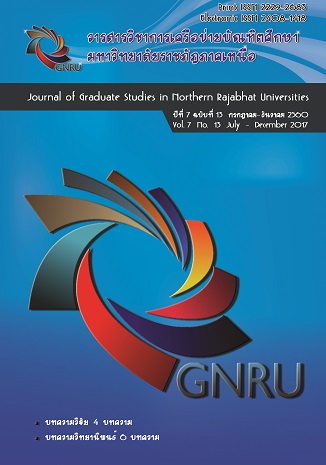การพัฒนากลยุทธ์การบริหารจัดการขยะขององค์กรปกครองส่วนท้องถิ่น จังหวัดกำแพงเพชร; Strategy Development for Waste Management of Local Government in Kamphaeng Phet
Main Article Content
Abstract
การวิจัยมีวัตถุประสงค์ดังนี้เพื่อ 1) ศึกษาสภาพ ปัญหา และปัจจัยที่เกี่ยวข้องกับการบริหารจัดการขยะ 2) พัฒนากลยุทธ์ และ 3) ประเมินกลยุทธ์การบริหารจัดการขยะขององค์กรปกครองส่วนท้องถิ่น จังหวัดกำแพงเพชร กลุ่มตัวอย่างที่ศึกษา ได้แก่ องค์กรปกครองส่วนท้องถิ่น 73 แห่งในจังหวัดกำแพงเพชร ประกอบด้วย นายกองค์กรปกครองส่วนท้องถิ่น ประธานสภาองค์กรปกครองส่วนท้องถิ่น และพนักงานองค์กรปกครองส่วนท้องถิ่น จำนวน 469 คน ผู้ให้ข้อมูลในการพัฒนาและประเมินกลยุทธ์ จำนวน 71 คน โดยการเลือกแบบเจาะจง เก็บรวบรวมข้อมูลโดยการสัมภาษณ์ การประชุมเชิงปฏิบัติการ 2 ครั้ง การสัมมนาอิงผู้เชี่ยวชาญ และแบบประเมินกลยุทธ์ วิเคราะห์ข้อมูลโดยหาค่าเฉลี่ย ค่าส่วนเบี่ยงเบนมาตรฐาน และการวิเคราะห์เนื้อหา
ผลการศึกษาพบว่า 1. สภาพการบริหารจัดการขยะ พบว่า มีการดำเนินการทุกรายการ ปัญหาและปัจจัยที่เกี่ยวข้องในภาพรวม พบว่า องค์กรปกครองส่วนท้องถิ่นมีหน้าที่รับผิดชอบบริหารจัดการขยะตามกฎหมายแต่บุคลากร งบประมาณ เครื่องมือมีไม่เพียงพอ และการบังคับใช้กฎหมายไม่มีประสิทธิภาพ 2. การพัฒนากลยุทธ์การบริหารจัดการขยะขององค์กรปกครองส่วนท้องถิ่น จังหวัดกำแพงเพชร มี 9 กลยุทธ์ ได้แก่ 1) พัฒนาการจัดทำแผนจัดการขยะขององค์กรปกครองส่วนท้องถิ่น 2) พัฒนาการจัดทำงบประมาณในการบริหารจัดการขยะขององค์กรปกครองส่วนท้องถิ่น 3) สร้างเสริมสมรรถนะผู้บริหารและบุคลากรในองค์กรปกครองส่วนท้องถิ่น ในการจัดการขยะร่วมกับชุมชนท้องถิ่นอย่างมีประสิทธิภาพ 4) สร้างเครือข่ายระหว่างองค์กรปกครองส่วนท้องถิ่นในพื้นที่ใกล้เคียง ในการบริหารจัดการขยะร่วมกับชุมชนท้องถิ่น 5) ปลูกฝังและสร้างจิตสำนึกการจัดการขยะให้ประชาชนในชุมชนท้องถิ่น 6) ส่งเสริมให้มีหน่วยงานหลักในท้องถิ่นรับผิดชอบจัดการขยะ 7) พัฒนานวัตกรรมและเทคโนโลยีที่เหมาะสมกับท้องถิ่นในการจัดการขยะ 8) สร้างความร่วมมือกับหน่วยงานต่างๆในการจัดการขยะ และ 9) ปรับปรุงกระบวนการควบคุม กำกับ ติดตาม และประเมินผลการบริหารจัดการขยะอย่างเป็นระบบและต่อเนื่อง 3. การประเมินกลยุทธ์การบริหารจัดการขยะขององค์กรปกครองส่วนท้องถิ่น จังหวัดกำแพงเพชร พบว่า ความสอดคล้อง ความเหมาะสม ความเป็นไปได้ และการยอมรับได้อยู่ในระดับมาก
Abstract
The objectives of this research were 1) to study states, problems, and factors related to waste management, 2) to develop strategies, and 3) to evaluate the strategies for waste management of the local government in Kamphaeng Phet. The sample comprised 73 local governments in Kamphaeng Phet consists of administrators, chairman of the council, and staffs had used questionnaires as a tool to collect data from 469 samples, for development and evaluation the strategies had studied through best practice, two seminars, connoisseurship, and evaluation by 71 experts. The data were analyzed using mean standard deviation and content analysis.
The research revealed that: 1. the states were found in every process, problems and factors related as a whole found that; the local government was responsible for waste management in accordance with the law, but there were not enough personnel, budget, tool, and law enforcement was not effective, 2. as for the development of the strategies for waste management of the local government in Kamphaeng Phet had nine strategies; 1) to develop planning for waste management of the local government, 2) to develop budgeting for waste management of the local government, 3) to enhance competency of personnel in the local government for waste management with local communities effectively, 4) to create a network between the local government in the neighborhood for waste management with local communities, 5) to cultivate and raise awareness of waste management to people in local communities, 6) to encourage the main unit in the local government for waste management, 7) to develop innovation and appropriate technology for waste management, 8) to collaborate with various organizations for waste management, and 9) to improve process of controlling, monitoring and evaluation for waste management systematically and ongoing, and 3) the evaluation of the strategies revealed that the consistency, propriety, feasibility, and acceptability were at a high level.

